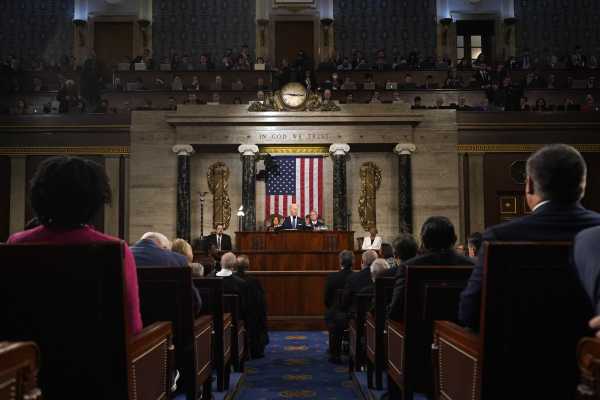
Joe Biden mentioned hamburgers in his 2023 State of the Union address.
Specifically, the president wondered why the person who rings up your burger order may have signed a noncompete agreement preventing them from working at a nearby burger restaurant that pays better — the kind of agreement that 30 million workers in the US are also beholden to. Biden vowed that these agreements will soon be banned.
That’s the current job of Federal Trade Commission chair Lina Khan, who announced in January that the agency had proposed a rule to ban the practice of forcing workers to sign noncompete clauses, which forbid employees from working for their employer’s competitors for a certain amount of time after they leave their jobs.
“The freedom to change jobs is core to economic liberty and to a competitive, thriving economy,” Khan said in a statement. “Noncompetes block workers from freely switching jobs, depriving them of higher wages and better working conditions, and depriving businesses of a talent pool that they need to build and expand. By ending this practice, the FTC’s proposed rule would promote greater dynamism, innovation, and healthy competition.”
If enacted, the proposed rule would give Americans more choice in where they work and, by extension, higher pay. They could more easily work for rival companies or start their own companies with less fear of being sued. Such mobility could make what’s already a tight hiring economy even tighter, as workers have even more options of which open jobs they can take.
The notice of proposed rulemaking came a day after the FTC sued three companies over their noncompete clauses, the first time the agency had ever done so. It also came after numerous other efforts the agency has taken to protect competition, including lawsuits to block or unwind mergers and an effort to modernize the commission and the Department of Justice’s merger rules.
The final rule will be issued following the ongoing public comment period. Congress can review and disapprove of the rule, which would void it, but that rarely happens and is especially unlikely to happen with a Democratic-majority Senate. Once the rule becomes final, its legality will likely be tested in court.
The proposed rule followed calls from advocacy groups and the Biden administration to ban the practice of noncompetes, so it’s not a surprise that Biden is lauding the FTC’s move now. His 2021 pro-competition executive order asked the FTC to use its authority to ban noncompetes, and consumer rights group Public Citizen made the same request in a letter to the FTC last December. Several pro-consumer and pro-labor groups petitioned the FTC for such a rule during the Trump administration as well. Noncompete clauses are already banned in several states, including California, where some — but not all — of the notoriously noncompete-heavy tech companies are based.
The FTC estimates the proposed rule could increase wages by $300 billion a year and impact 30 million Americans. A 2014 survey of economists found that nearly 20 percent of workers have noncompete clauses in their contracts. That number is more likely 50 percent for people in high-skilled and high-tech jobs, according to Matt Marx, a professor at Cornell University’s economics and management school, who has been studying noncompete agreements for 15 years.
“I signed my first noncompete in 1995 and didn’t realize what I was doing — and that’s the case for many if not most workers,” he said.
Marx added that these agreements don’t just specify that you can’t share a specific company’s secrets, but are often interpreted more broadly so that a person can’t use skills they had prior to working at that company — something he said can be debilitating to high-skilled workers and entrepreneurs.
One person Marx interviewed, a woman with a PhD in speech recognition who had worked at Bell Labs for nearly two decades, said she had to get a “random computer programming” job outside her field after working for 18 months at a startup where she’d signed a noncompete agreement.
“You’ve been working in this industry for 20 years? Oh, well, sorry, you can’t do that anymore because you worked for us for two years,” Marx explained. “Tough luck, you have to find something else to do.”
Detractors of noncompete clauses say the agreements prohibit workers from getting jobs with competitors or even within the same industry. In doing so, they restrict job mobility and prevent workers from being able to push for higher wages, since changing jobs is often how workers get higher pay. These clauses can send them on lengthy job searches or even “career detours.”
Pro-consumer and pro-labor groups applauded the FTC’s move, as well as the agency itself.
“The FTC’s action today to ban noncompete clauses will also provide a major boost to small businesses and entrepreneurship,” Stacy Mitchell, co-director of the Institute for Local Self-Reliance, told Recode. She added that noncompetes can make it harder for workers to leave employers to start their own businesses that might compete with them.
Sen. Elizabeth Warren (D-MA) commended the FTC’s actions to “protect workers” from “harmful contracts.” She tweeted, “Noncompete clauses give companies unfair power over workers, enabling them to cut wages and benefits without fear of workers finding a new job or starting their own business.”
Pro-employer groups like the US Chamber of Commerce have argued that noncompete clauses can actually be pro-competitive because they protect an “employer’s special investment in, training of, and
Update, February 7, 11:25 pm ET: This story, originally published on January 5, has been updated with Biden’s State of the Union call to ban noncompete clauses.
Sourse: vox.com






